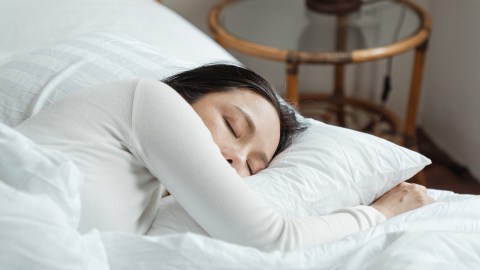Some sleep is worse than no sleep for keeping fear in check

Credit: Ketut Subiyanto from Pexels
- A new study finds that people without sleep fare better in learning what to fear and not fear than those getting only some sleep.
- Test subjects learned to associate colors with electric shocks, but only some unlearned it.
- The findings could be used to help create new treatments for those at risk of PTSD or anxiety.
The study, titled “Partial and Total Sleep Deprivation Interferes with Neural Correlates of Consolidation of Fear Extinction Memory,” was published by a team of researchers from the University of Pittsburgh and Harvard Medical School and can be found in the journal Biological Psychiatry: Cognitive Neuroscience and Neuroimaging.
The researchers split 150 test subjects into three groups. The first got a full night’s sleep, the second was “sleep-restricted” to a few hours’ rest at the beginning of the night, and the third was utterly sleep deprived. Starting the next morning, they were all subjected to “fear conditioning” and “fear extinction.”
The conditioning involved participants seeing one of three colors on a screen, two of which were paired with a mild electric shock. The idea being that this teaches a person to begin to develop a fear of that color. Later, the subjects underwent “fear extinction,” which had them viewing one of the colors again, but without the shocks. This step is intended to teach subjects that there is no longer a reason to fear that image and that it is now “safe.”
Later that evening, the test subjects viewed the colors again while having their brains scanned. This allowed the scientists to see if their brains were reacting to the colors with fear despite having “learned” that electric shocks were no longer a threat.
Curiously, the brains of those getting no sleep resembled those of the people who enjoyed a full night’s rest twelve hours later in that the fear response was absent. Those getting only a few hours of sleep showed signs of fear in their brain activity. This suggests that getting only a little rest might be worse than getting none at all, at least when it comes to learning and unlearning fear responses.
Brain activity recorded during the tasks painted a similar picture. Those who got a full night’s sleep had more activity in the prefrontal cortex, an area tied to emotional regulation. In comparison, those getting only half a night’s rest saw more activity in the regions associated with fear. Those getting no sleep had less activity in the fear areas overall.
The research team suggests that restricted sleeping may lead to a severe reduction in the time we spend in the Rapid Eye Movement (REM) phase of sleep. While best known for being the part of the night when we dream, it is also when memories are consolidated. REM tends to occur at the end of 1.5-2 hour periods during sleep.
This study may help explain why people in high-stress jobs with short sleep schedules, such as emergency response workers, medical professionals, or soldiers, can leave people even more anxious or shell shocked.
Conceivably, this could be used to help develop new treatments for these conditions. In the meantime, more research is needed before you decide to stay up for a week to avoid developing a phobia.





